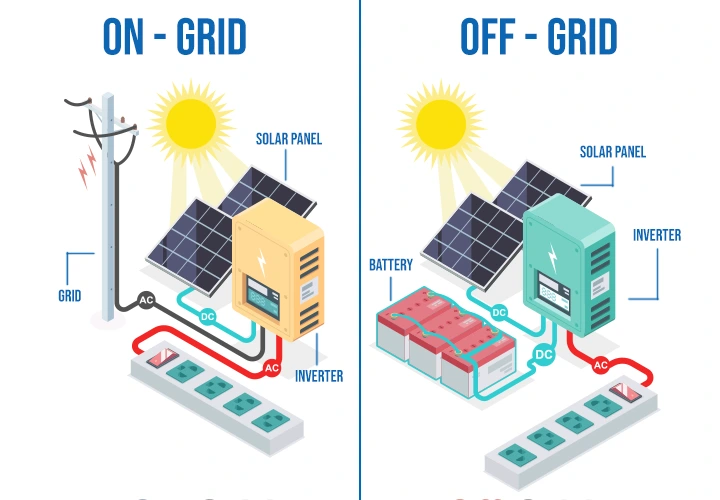Solar energy has become the most sought-after form of energy in modern households who are seeking to decrease their carbon footprint and go green. When switching to solar energy there are many types of systems to be considered. There are mainly two types of Rooftop Solar Panel for home: on-grid and off-grid. The main difference between on-grid (grid-tied) and off-grid (stand-alone) solar systems lies in their connection to the electrical grid. Understanding the difference between on-grid and off-grid solar system configurations is essential for selecting the appropriate setup for your energy needs. In this blog, we will discuss the two types in detail:
On-Grid Solar System:
The on-grid solar system is connected to the local electricity grid. It works in conjunction with the grid, allowing the user to draw electricity from the grid when solar production is insufficient and to feed excess solar power back into the grid.
Components:
Solar Panels: Convert sunlight into electricity.
Inverter: Converts direct current (DC) from solar panels into alternating current (AC) usable in homes.
Net Metre: Measures the amount of electricity consumed and produced.
Benefits:
Grid Accessibility: Connection to the grid ensures the availability of electricity during periods of low solar production.
Financial Benefits: Excess energy produced can be fed back into the grid for credits or reduced electricity bills through net metering.
Cost-Effective: This system is more cost-effective initially as backup storage is not necessary.
Off-Grid Solar System:
An off-grid solar system is independent of the utility grid. It operates autonomously, generating and storing its electricity without being connected to an external power source.
Components:
Solar Panels: Convert sunlight into electricity.
Battery Bank: Stores excess energy generated during sunny periods for use during low sunlight periods.
Inverter: Converts DC from the battery bank into AC for household use.
Generator: Provides additional power during extended periods of low solar production.
Benefits:
Grid Independence: The stand-alone system does not rely on the grid for electricity and is suitable for remote locations with no access to the grid.
Energy Storage: Batteries are required to store excess energy for use when sunlight is unavailable.
Higher Initial Cost: It needs higher upfront costs due to the need for a battery storage system.
Most solar installation companies in Tamilnadu offer both On-Grid and Off-Grid Systems. A few of the factors to keep in mind when choosing between the two systems:
Location: While on-grid systems are more suitable for urban with readily accessible grid systems, off-grid systems are ideal for remote locations.
Cost: On-grid systems are often more cost-effective initially, while off-grid systems have higher upfront costs due to the inclusion of battery storage.
A more increasingly popular system is the Roof Top Solar Hybrid system. It combines the two types of solar systems to give you the best option as it is designed to improve efficiency through features like battery storage as well as grid connection.
Also read: Essential Factors for Installing a Rooftop Solar Hybrid System in Tamil Nadu
The decision between on-grid and off-grid solar systems is completely dependent on individual circumstances, location, and energy requirements. Consult our solar professionals at the Leading Rooftop Solar System Company in Tamilnadu who can help you determine the most suitable solution.


 from Webdoux
from Webdoux